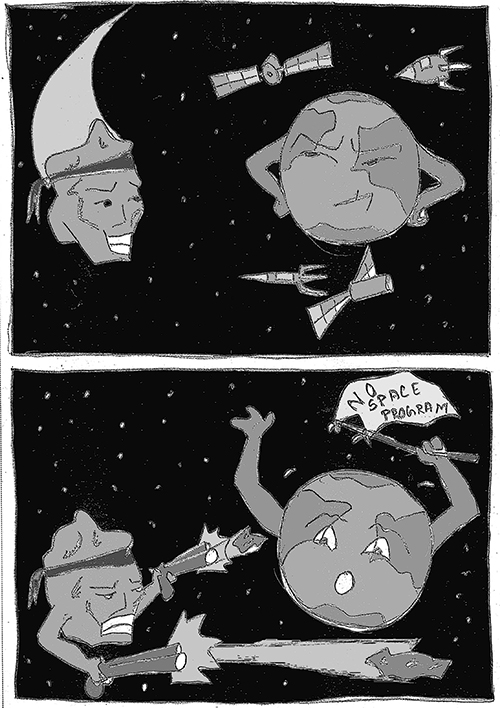Last month an asteroid raced into our atmosphere and across the Russian skyline, much to the delight of many Russians who conveniently had videocameras mounted on the dashboards of their cars.
Meteoric inspiration

Last month an asteroid raced into our atmosphere and across the Russian skyline, much to the delight of many Russians who conveniently had videocameras mounted on the dashboards of their cars.
Scientists used video of what’s now referred to as the Chelyabinsk meteor to calculate that it came from the Apollo group of near-Earth asteroids. Its arrival blew windows out of buildings, injuring many people with the broken glass. Videos of the event have gotten millions of views on YouTube.
Despite the destruction, or perhaps because of it, a 15-meter-wide rock hurdling toward Earth is exactly what we needed to rekindle our love for space.
Scientists have tried, on several occasions over the last few years, to get us excited about space, especially after the recent defunding of NASA. The 2012 DA14 asteroid, which was predicted to be the “closest ever Earth approach,” had its own countdown clock on most cable news channels, but it was barely noticed—its lackluster arrival 16 hours after the Russian meteor couldn’t compete.
SpaceX made history as the world’s first private company to deliver cargo to the International Space Station last year, and its continued success has been both exciting and sad, as it’s a constant reminder of NASA’s current state. And now, with the Sequester and other impending government-induced financial disasters, money for space travel seems further away than ever.
Everyone’s favorite astrophysicist, Neil deGrasse Tyson, is often quoted as saying that “by defunding NASA, we have defunded our national imagination.” In essence, the commitment made with government dollars to discovering the unknown gives us the inspiration to be creative and dream. This is especially important when it comes to children who are now being raised in a country without a space program.
Children’s imaginations depend on seeing the possibilities of our universe. Kids who grew up in the 1950s and ’60s not only witnessed the regular occurrence of people being sent into space but also saw them walk on the moon.
We’ve lost that wonder because we’re no longer willing to spend the money. Instead, government squabbles emerge every few months, monopolize the news and offer nothing but discouragement. All the while, they’re defunding more scientific endeavors.
So, in order for us to look up again, space had to come straight at us, in the form of the Chelyabinsk meteor.
What seems most resonant about the meteor’s arrival is that it brought some perspective. Amid the constant impending governmental disasters, it’s often hard to remember that we’re hurtling through space.
Spending our money on scientific research that sends people beyond the atmosphere isn’t a frivolous expenditure; it’s necessary for our sense of imagination. By demonstrating our ability to push the current limits of scientific research, we inspire others in our communities as well as children growing up in this world.
While our current shift toward “local everything” has brought about great innovation in our communities, looking up and beyond could do wonders for our sense of possibility. Funding space exploration would show that there are no limits to our creativity.
The Russian meteor’s appearance lasted only a few moments, and days later we were back to the grind. For a moment, though, there was a possibility that a kid who’d never considered becoming an astronaut suddenly thought about exploring space. Or a kid who had never considered where asteroids came from thought about becoming an astrophysicist.
As for me, it made me check up on Curiosity, sitting way out there on Mars. It made me look up the SpaceX Dragon’s progress on docking with the International Space Station (Twitter-savvy Canadian Chris Hadfield is commanding the ship). And it made me think about whether my academic endeavors might one day lead me to do research in space.
All we need is a little inspiration to consider the endless possibilities, and if we’re unable to convince our government that funding a space program is a necessity, then I’m glad that space itself can send us a few reminders every once in a while.





